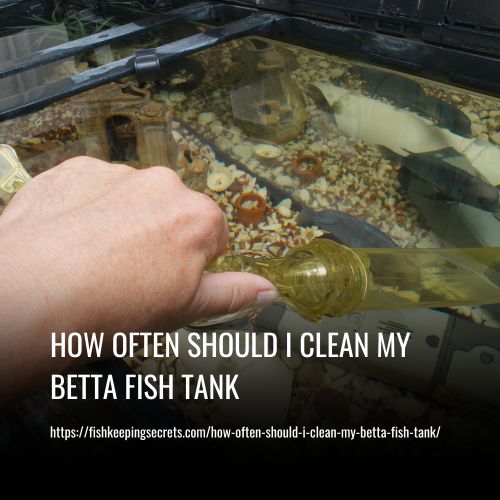It is recommended to clean your betta fish tank at least once a week to maintain good water quality. However, the frequency may vary depending on factors such as the size of the tank, the number of fish, and the efficiency of the filter. It is important to regularly check the water parameters and observe the condition of the tank to determine if more frequent cleaning is necessary.

How Often Do You Clean a Betta Fish Tank With Filter
Cleaning a betta fish tank with a filter is typically done twice a week. The presence of a filter helps to remove waste from the tank, reducing the frequency of cleaning. However, it is still important to clean the substrate and scrape off algae every other week. A deep clean, which involves thoroughly cleaning the tank and all its components, should be done monthly to maintain optimal water quality for your betta fish.
How Often Should You Clean Betta Fish Tank Without Filter
Cleaning your betta fish’s water without a filter requires regular maintenance to ensure a clean and healthy environment. It is recommended to perform a deep clean of the tank once every two weeks. This deep clean should involve thoroughly cleaning the tank, removing any debris, and replacing a portion of the water.
While a filter helps to remove debris and maintain water quality, without one, it is crucial to manually clean the tank to prevent waste buildup and potential health issues for your betta fish. Regular water changes and tank cleaning will help maintain a clean and balanced environment for your fish.
Factors Affecting Betta Tank Cleaning Frequency
Factors affecting the frequency of Betta tank cleaning include:
1. Tank Size
The size of your tank plays a role in determining how frequently it needs to be cleaned. Larger tanks are generally more stable in terms of water quality, so they typically require fewer water changes. A 20-gallon tank with just a Betta and a few invertebrates may only need a monthly or bi-weekly water change. However, smaller tanks are more susceptible to changes in water quality, so they may need more frequent cleaning.
2. Tank Mates
If you have other fish in the tank with your Betta, it will affect the water quality, and you may need to clean more often. Other fish tend to produce more waste, which increases levels of ammonia in the tank. The frequency of cleaning will also depend on the type of fish you have. Species like Plecos that stir up debris or fast-swimming fish like Tetras that create currents may require more regular cleaning.
3. Tank Equipment
The equipment you have in your tank can greatly impact the cleanliness of the water and how often you need to clean it. If you have a filter, it will help remove waste from the tank and reduce the need for frequent water changes. Similarly, a heater can accelerate waste breakdown, while a bubbler or air stone can prevent stagnant conditions by adding oxygen to the water.
4. Plants
Plants in the tank can also play a crucial role in maintaining water cleanliness. They act as natural filters, absorbing waste and producing oxygen for the fish. The Walstad method, a popular natural approach to aquarium keeping, relies heavily on plants and organic soil to create a self-cleaning system. Some tank owners using this method may not need to do any water changes, only topping up evaporated water.
How Long Does It Take To Clean A Betta Fish Tank
The cleaning time for a Betta fish tank can vary depending on factors such as tank size and how long it has been since the last cleaning. On average, the entire process should take approximately 30 minutes. This includes draining the water, cleaning the gravel, and refilling the tank with fresh water.
However, if additional tasks such as trimming plants are required, it may take up to 30-60 minutes. It is important to allocate enough time to thoroughly clean the tank and ensure the well-being of the fish.
How Long Should You Wait To Put A Betta Fish In A Tank After Cleaning
It is recommended to wait at least an hour before putting your Betta fish back into the tank after cleaning. This allows the fish to acclimate to the new water conditions. However, if you want to be extra careful, you can wait longer. The acclimation process involves slowly introducing water from the new tank into the current one every few minutes.
Additionally, it is important to ensure that the new water is at the same temperature as the old water. This can be achieved by using a thermometer or letting the new water sit out until it reaches the same temperature. Taking these steps will help ensure the well-being of your Betta fish.
What Tools And Instruments Are Needed To Clean A Betta Tank
To ensure that your Betta fish tank is clean and comfortable for your pet, you’ll need some basic tools and instruments. Although not everything may come with the purchase of your tank and Betta fish, you won’t need too many additional items to get started. You’ll want to have a fishnet, extra containers for water exchanges, and a soft-bristled brush or sponge on hand. These basic items are enough to keep your tank clean and maintain a healthy environment for your Betta.
However, if you want to make the cleaning process easier and more convenient, you may also consider buying an algae scrub brush, gravel vacuum, or sieve. These additional tools can greatly speed up the cleaning process so that you can quickly get your Betta back into its clean home where it will be comfortable again.
How Often to Change Betta Fish Water
It’s important to maintain a healthy living environment for your Betta fish, and a key way to do this is by changing the water in their tank regularly. Most aquariums require weekly water changes, with smaller tanks needing even more frequent changes. This universal rule of once per week keeps the water clear and helps prevent serious health complications that can arise from neglecting water quality.
Even if the water looks clear to the human eye, it may still contain harmful invisible particles like ammonia and nitrate which build up quickly and can cause illness or death in your Betta. By staying consistent with regular water changes for your Betta, you are helping to ensure their long-term health and well-being.
How Much Water Should You Change
Understanding how much water to change in an aquarium is crucial to ensuring the health and well-being of your fish. For a larger tank with a proper filtering system, experts suggest changing only 10-20% of the water at a time. This is because changing too much water can severely disrupt the carefully balanced ecosystem that exists within the tank, leading to stress and potentially even death for your fish.
However, when medicating your fish or keeping them in bowls (although not recommended for long-term health), it’s best to replace 50-70% of the water after the medication process or on a regular weekly basis.
It’s essential always to use the right amount of water when changing it as changing too little will not adequately reduce nitrate and ammonia levels while changing too much would unbalance temperature, bacteria, and pH levels among other features.
Such rapid and extreme changes in these factors can be too stressful for most fish, leading them unable to adapt thereby resulting in their death. In conclusion, moderation is key when it comes to changing aquarium water – make changes gradually and carefully to maintain a healthy environment for your aquatic pets.
FAQs
To keep your 2.5-gallon betta tank clean and maintain a healthy environment for your fish, it is recommended to do a partial water change of about 25-50% every week. Since there is no filter in the tank, more frequent water changes are necessary to ensure good water quality. Additionally, regular cleaning of the gravel and decor is important to prevent waste and debris buildup. By maintaining regular maintenance and cleaning routines, you can help keep your betta fish happy and healthy in this smaller, unfiltered tank.
If you don’t clean your aquarium, your fish can become stressed and susceptible to infections and diseases. Dirty water reduces the amount of dissolved oxygen, causing fish to gasp for air at the water surface. If the water quality isn’t improved, the fish can eventually die. It’s important to keep your aquarium clean to ensure the health and well-being of your fish. Additionally, if your tank is too small, it’s recommended to move the fish to a larger tank.
No, betta fish tanks are not hard to clean, especially if you have a filter. With the right tools and techniques, it can be a quick and easy task. It’s also important to clean the tank regularly to prevent it from getting too dirty, which will save you time and effort in the long run.
If your three-gallon betta tank doesn’t have a filter, it’s best to clean it at least once a week. During the cleaning process, make sure to change around 50 percent of the water. However, if your tank has a filter, you can get away with changing only 20 percent of the water during each cleaning.
Yes, it is possible to do a full water change for betta fish, but it is not recommended. Doing a full water change can cause severe stress for the fish. It is better to do partial water changes and gradually acclimate the fish to any new conditions.
Yes, betta fish need their tanks to be cleaned regularly in order to maintain their health and happiness.
The Betta’s capacity to endure in an unclean tank relies on its resilience. There is no definitive answer to how long they can survive under such conditions. Additionally, tank size also plays a role. The more important question is when the Betta will begin to show signs of distress. If it appears unwell, it may have been suffering for some time without your awareness.
For a Betta tank with a capacity of only one gallon, it is recommended to replace all the water once a week. Alternatively, incorporating an aquaponics system can be helpful in reducing the need for frequent cleaning.
Bettas are fish known for their vibrant colors and robust nature. When healthy, their fins are open and they float freely when still, but if unwell, you may notice their color fade, their fins become more rigid, and they may start swimming erratically.
Overfeeding Betta fish can lead to excess food waste in the tank, which can increase pollutants and contribute to poor tank conditions due to the fish’s increased waste production.
To maintain a healthy and clean tank for your Betta, it is recommended to limit feeding to two to four pellets either once or twice a day. Overfeeding can result in higher pollutant levels and stress for the Betta, leading to the need for more frequent cleaning.
Cloudy water may occur when introducing a Betta fish to its tank for the first time due to an occurrence called “Bacteria Bloom”. This is typically not harmful and will go away on its own after a few days. If it persists beyond a week, it may be necessary to change the tank water.
Using a filter simplifies the maintenance of your Betta’s environment, reducing the need for frequent and intensive cleanings and promoting both your own and your Betta’s satisfaction.
Conclusion
Cleaning your Betta fish tank is essential for their health and well-being. The recommended cleaning frequency of a tank is influenced by factors such as the tank’s size, the amount of fish present, and their feeding routine. It’s important to remember that neglecting to clean your Betta’s home can lead to serious health issues for them such as fin rot or bacterial infections.
By following our guidelines and using a reliable water testing kit, you can ensure that your Betta has a clean and healthy environment in which to thrive.



